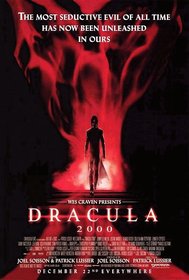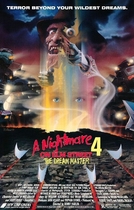Our editor-in-chief Nate Yapp is proud to have contributed to the new book Hidden Horror: A Celebration of 101 Underrated and Overlooked Fright Flicks, edited by Aaron Christensen. Another contributors include Anthony Timpone, B.J. Colangelo, Dave Alexander, Classic-Horror.com's own Robert C. Ring and John W. Bowen. Pick up a copy today from Amazon.com!
Dracula 2000 (2000)
I'm sure I've said this before, but at this point in cinematic history, it's very hard to make a Dracula film and do something new with it. You have to admire writer/directors like Patrick Lussier who, along with writer Joel Soisson, makes a valiant attempt at creating a film that acknowledges and pays homage to past Draculas while taking bold new steps that will both not offend or seem ridiculous to the traditionalists and keep the audience who wants to see something fresh and exciting entertained for two hours. Not only is it a valiant attempt, but Lussier and Soisson nearly succeed in creating a film that deserves a slot next to Nosferatu (1922) and the Draculas of directors Tod Browning (1931), Terence Fisher (1958), John Badham (1979), and Francis Ford Coppola (1992). Stress the word "nearly."
Dracula 2000 opens with a very familiar scene -- the ship Demeter, carrying Dracula, on route to England in the 19th Century. If one was completely unfamiliar with the premise of Dracula 2000, as I was at this point, you might think you're in for another relatively faithful, but reshuffled (most are) retelling of Bram Stoker's novel. However, we don't stay with the Demeter and subsequent vampiric footprints on the English shore very long before we're rather briskly deposited in 2000. A relative of Abraham Van Helsing's (Matthew, played by Christopher Plummer) is now running an antique business that, from the looks of its offices, is quite successful. It's difficult to tell from the film whether only the name is the same, but the antique business is housed in a building bearing a large "Carfax" on its pediment (I'm guessing, and it would make more sense within the context of the film, that it's supposed to be a restored Carfax Abbey; that we never know for sure is one of the minor flaws in this film). Van Helsing has an understandable interest in antiques that are wrapped up with vampire mythology, which he keeps for his personal collection, to the chagrin of his profit-oriented, young staff.
In fact, his young staff is so profit-hungry that they hatch a plot to break into Van Helsing's secret vault, which is constructed like Fort Knox, and which they figure must contain an incredible treasure. When they successfully break in, all they find is a lot of odd skulls, old books and eventually, a bizarre coffin. Since the coffin is extensively booby-trapped, they figure it must contain some marvelous booty, if only they could figure out how to open it. Instead, they carry the whole thing through a series of underground tunnels and fly with it towards a Caribbean island. When they finally figure out how to open the coffin, they wish they hadn't, since Dracula 2000 begins its full-force horror onslaught as the plane "crash lands" in Louisiana bayous outside of New Orleans.
As a nod to the previous Draculas, Lussier gives us fairly literal quotations. We get the rats of Nosferatu on the Demeter, the floating lovemaking of the Langella version, the surreal sequences of Coppola's vision. There are even hints of John Carpenter's Vampires at one point. Perhaps the biggest reference of them all, though, is to a film that deserves a place in the list at the end of my first paragraph -- Interview with the Vampire. The most obvious "coincidence" is the New Orleans setting, but there are thematic similarities, as well.
These quotations and references make Dracula 2000 fun for die-hard vampire film fans--it's almost like playing a trivia game while you watch, and most of them work within the context of the film. However, for anyone who requires their movies to have strong doses of originality, the fact that the references make up a large portion of Dracula 2000's material may be a problem.
I don't need something to be unprecedented to enjoy it, and after all, if you're going to a Dracula film, you're surely not going to expect something you've never seen before, but influence and necessary similarities are one thing. Visuals consisting mostly of conscious lifts from other films is another. Dracula 2000 rides a fine line between the two.
Part of Lussier's goal may have been to try to placate more traditionalist fans in anticipation of his extension of the Dracula mythology. I don't want to give any spoilers, but Lussier and Soisson make a huge, and I mean astronomical, leap in the lore. I can't imagine that their contribution to the mythology will ever become standard, but if for nothing else, the bizarreness of the "twist" makes Dracula 2000 a must see for vampire fans strictly for its novelty value.
However, as enjoyable as Dracula 2000 was for me, I couldn't get past the fact that there seemed to be something missing--and this is my primary reason for not granting the film "must-see" status, despite the novelty factor. Too often, everyone seemed to be "going through the motions." I sensed an apathy on many of the cast and crew's part, including Gerard Butler, our Dracula star, and when you're trying to created a big, scary thrill ride, that can create problems.
Dracula 2000 certainly has the framework of a classic, there are lots of scrumptious visuals (including special effects/make-up), the nods to other films are fun, the twist is entertainingly odd, it's got a great score/soundtrack, and it's nice to have a non-period Dracula film. If only the cast and crew could have expressed more passionate involvement, this just might have been a masterpiece.
Trivia:
The Mardi Gras sequence was filmed in August - six months after the actual event.










Actually it's revealed during
Actually it's revealed during the movie that Matthew Van Hesling actually is Abraham Van Helsing and has kept himself alive by draining Dracula's blood over the years.